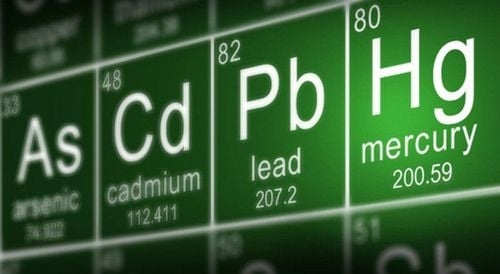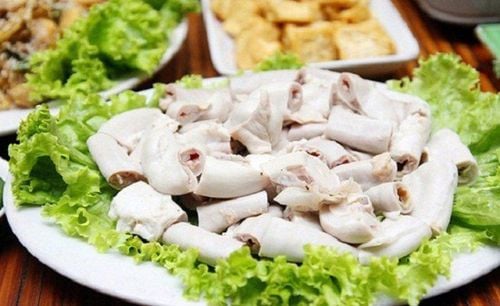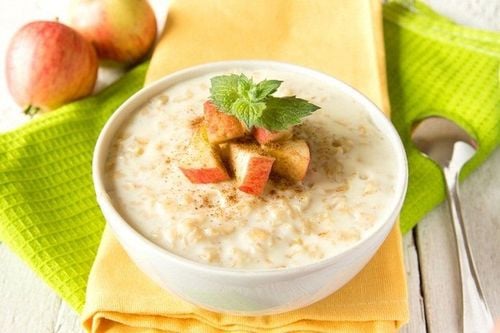This is an automatically translated article.
When you are pregnant, it is essential to avoid foods and drinks that can be dangerous to you and your unborn baby. While most foods and drinks are perfectly safe to enjoy, you should avoid certain types such as raw fish, unpasteurized milk, alcohol, and fish that are high in mercury. In addition, certain foods and beverages such as coffee and foods with added sugars should be limited to promote a healthy pregnancy.
1. Fish with high levels of mercury
Mercury is a highly toxic element and is most commonly found in polluted water. In higher concentrations, mercury can be toxic to your nervous system, immune system, and kidneys. Mercury can also cause serious developmental problems in children.
Since mercury is found in polluted seas, large marine fish can accumulate high levels of mercury, fish with high levels of mercury should be avoided while pregnant and nursing.
High-mercury fish you want to avoid include: shark; swordfish; king mackerel; tuna (especially bigeye tuna); marlin; tilefish from the Gulf of Mexico; grainy oranges
According to the Food and Drug Administration (FDA), it is healthy to consume low-mercury fish during pregnancy, and these fish can be consumed up to three times per day. the week.
Fish containing low levels of mercury are abundant and include: anchovies; snow fish; flounder; black dot cod; salmon; Tilapia; salmon (fresh water). Salmon and anchovies are good options for pregnant women, as these fish are both high in omega-3 fatty acids, which are important for your baby.
2. Raw or undercooked fish
This dish will be difficult for sushi fans, but it is an important dish. Raw fish, especially shellfish, can cause a number of infections, viral, bacterial, or parasitic infections.
Some infections with these viruses can only affect you, causing dehydration and weakness, or can be passed on to your unborn baby with serious consequences.
Pregnant women are susceptible to listeria infection when consuming raw fish. According to the Centers for Disease Control and Prevention (CDC), pregnant women are 10 times more likely to get Listeria infection than the general population. Pregnant Hispanic women are 24 times more likely to be at risk.
In contaminated soil and water or plants, these bacteria can appear. Raw fish can become contaminated with bacteria during processing, including smoking or drying.
Listeria can be passed to your baby through the placenta, even if you don't have any signs of illness, or it can lead to premature birth, miscarriage, stillbirth and other serious health problems for the unborn baby.

Mẹ bầu không nên ăn gì: Cá sống hoặc chưa chín cần hạn chế
3. Undercooked or raw meat
Using raw or undercooked meat increases the risk of certain bacteria or parasites, including: Toxoplasma, E. coli, Listeria and Salmonella.
These bacteria can be a threat to fetal health, which can lead to stillbirth or serious neurological diseases.
While most bacteria are found on the surface of the whole piece of meat, other bacteria have been found to exist inside the muscle fibers. Some whole cuts of meat, such as sirloin, sirloin, or ribeye from beef, lamb, and veal, may be safe to eat when uncooked. However, this only applies when the meat is whole or unprocessed and the outside is fully cooked. So, what should pregnant women not eat? Pregnant women should not eat cut meat, including meatloaf, burgers, minced meat, pork and house meat.
4. Raw eggs
Salmonella bacteria can be present in raw eggs. Symptoms of salmonella infection often include: fever, nausea, vomiting, stomach cramps, and diarrhea. However, in some cases, this bacterial infection can cause uterine contractions, leading to premature birth or stillbirth.
Foods that often contain raw eggs include: Light scrambled eggs; poached eggs; Hollandaise sauce; Homemade egg sauce; some homemade salad dressings; homemade ice cream; homemade cakes
Most food products containing raw eggs are made with eggs that have been pasteurized and are safe to use. However, you should always read the labels to make sure before using these products.
5. Organ meats
Organ meats, a great food source of a variety of nutrients, including iron, vitamin B12, vitamin A, zinc, selenium and copper - all good for you and your baby. However, excessive use of vitamin A of animal origin is not recommended during pregnancy, especially during the first trimester of pregnancy. While this is mostly related to vitamin A supplements, it's best to keep your intake of organ meats in moderation.
6. Caffeine
According to the American College of Obstetricians and Gynecologists (ACOG), pregnant women are generally recommended to limit their caffeine intake to less than 200 milligrams (mg) per day. Caffeine is absorbed very quickly and easily crosses the placenta into the fetus. Because the fetus and its placenta do not have the key enzyme needed to metabolize caffeine, high concentrations can build up in the fetus.
Drinking a lot of caffeine during pregnancy has been shown by studies to limit fetal growth and increase the risk of having a low-birth-weight baby.
Low birth weight infants less than 2.5 kg are associated with an increased risk of chronic diseases in adulthood.

Mẹ bầu không nên uống gì trong đó cần hạn chế caffeine
7. Raw Sprouts
Raw sprouts, including: alfalfa, clover, radish and mung bean sprouts... are all foods that can be contaminated with Salmonella bacteria.
The environment for the germination of these vegetables is moist, which is quite ideal for these bacteria to grow and they are almost impossible to wash away. Therefore, you should completely avoid raw sprouts while pregnant. However, you can safely use sprouts once cooked.
8. Product has not been washed
Surfaces of unwashed or unpeeled fruits and vegetables can become contaminated with a number of bacteria and parasites, including Toxoplasma, E. coli, Salmonella and Listeria, which can be contaminated from soil or handling.
Contamination of these bacteria can occur at any time during production, harvesting, processing, storage, transportation or retail sale. A dangerous parasite that can live on fruits and vegetables is called Toxoplasma.
Most people infected with toxoplasma have no symptoms, while others may feel like they have the flu for a month or more.
Most infants infected with Toxoplasma while in the womb are asymptomatic at birth. However, symptoms such as blindness or intellectual disability can develop at some point in life.
9. Unpasteurized milk, cheese and fruit juices
What should pregnant women not drink? Raw milk, unpasteurized cheese and soft-ripened cheeses can contain a wide range of harmful bacteria, including Listeria, Salmonella, E. coli and Campylobacter.
Unpasteurized juice is also easy to cause bacterial infection in the body. Infections caused by these bacteria can have life-threatening consequences.
Bacteria can occur naturally or as a result of contamination during product collection or storage. Pasteurization - the most effective way to kill any harmful bacteria without changing the nutritional value of the product.
To reduce the risk of infection, pregnant women should only eat pasteurized milk, cheese and fruit juices.
10. Alcohol
Health care professionals advise pregnant women to avoid alcohol completely during pregnancy, as alcohol increases the risk of miscarriage and stillbirth. Even small amounts of alcohol can have a negative impact on the brain development of an unborn baby. Not only that, drinking alcohol during pregnancy can also cause alcoholism syndrome in the fetus, which is associated with facial malformations, heart defects and intellectual disability. Therefore, pregnant women do not use alcohol during this period.
11. Processed junk food
During pregnancy, it's time to start eating nutrient-rich foods to help both you and your baby. You will need to supplement with many essential nutrients for your body, including: Protein, folate, choline and iron.
You can eat as usual during the first trimester, then increase to about 350 calories per day in the second trimester and about 450 calories per day in the third trimester.
The optimal pregnancy eating plan should include: whole foods, with plenty of nutrients to meet the needs of you and your baby. Processed junk food is often low in nutrients but high in calories, added sugar and fat.
While gaining weight is quite necessary during pregnancy, excess weight gain is associated with many complications and diseases, including an increased risk of gestational diabetes, as well as other complications during delivery .
Pregnancy meal plans should focus on ingredients: protein, vegetables and fruits, healthy fats and high-fiber carbohydrates such as: whole grains, beans and starchy vegetables.
Hope the above information has provided you with more choices and answers about foods and drinks to avoid during pregnancy. Wish you always have a scientific diet and have a healthy pregnancy.
Please dial HOTLINE for more information or register for an appointment HERE. Download MyVinmec app to make appointments faster and to manage your bookings easily.
Reference source: healthline.com












